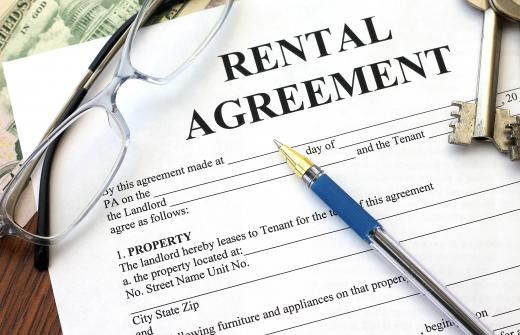
A pro forma contract is a rough copy or general use document that outlines the terms of an agreement without including specifics in some areas. The use of such a contract can allow a business or organization to let a possible contract partner examine the basic terms of a contract while using a general form that can be altered as needed. Different types of pro forma contracts might include employment agreements, rental agreements, and contracts between buyers and sellers.
The major factor that distinguishes a pro forma contract from a true contract is the specifics of the deal. For instance, it might include a blank space in place of an individual's name. In order to create a valid contract, the pro forma document would need to be altered to replace the blank space with the name of the individual relevant to the agreement. Until the contract has undergone final changes that fill in all of the undetermined spaces, the document serves simply as a general informational form.

Companies may use a pro forma contract to allow potential employees, clients, or business partners to review the language of a deal while the exact terms are being worked out. For instance, on a housing lease agreement, the name of the lessee and the monthly payment may be unspecified in a pro forma contract, but the terms of use and grounds for repossession could be laid out in full, since these clauses are inherent to the agreement and would not be subject to the negotiation. Having a pro forma contract on hand allows the lessee to review the general agreement and check for any legal issues before signing the true contract.

Creating pro forma contracts can be a good way for a business to streamline paperwork. Since pro forma documents ensure that any negotiable information can be altered or added to suit the individual contract at hand, they allow the creation of universal paperwork. For a company that specializes in a few specific types of deals, or for those who wish to create a general employment contract that covers all personnel, using pro forma documents can save time and increase efficiency.

The specific information excluded from a pro forma contract depends on the type of business transaction. In an employment contract, negotiable items might include salary, benefits, vacation time, paid leave, and contract length. For a rental agreement, the names of the tenants, pets permitted, and the length of the lease term might not be stipulated in a pro forma document. Buyers and sellers might need to fill in the terms of service, delivery dates, and specific companies named in the deal in order to create a full contract.
First, what is a contract? A contract is any written agreement that’s drawn up by one party and signed by all the parties involved. For example, when you subscribe to a meal delivery service such as Blue Apron or HelloFresh, when you click the box that says you agree to the terms and conditions, you’re signing that contract.
A pro forma contract template is just that — a template with blanks to be filled in depending on the particulars of the agreement between two parties. It’s often used for informational purposes. It forms the basis for the final contract, which will have all the details filled in. For example, in an apartment rental agreement, terms of rental are outlined, such as:
However, in a pro forma contract, the details of who’s renting the apartment, how much rent they’re paying, and how long the lease runs are all left blank, to be filled in later once the particulars are all known.
Pro forma contracts aren’t just useful for informational purposes. They also allow for clearer language to be used in the contract. According to World Commerce & Contracting, nearly 90% of people think contracts are “hard or impossible” to understand. A plain-language pro forma contract can help eliminate the confusion of so many contracts drowning in “legalese.”
World Commerce & Contracting also reports that across the board, 9% of contracts will wind up in dispute. Some industries, such as engineering, will see contract disputes of up to 21% of all contracts signed. The pro forma contract can help reduce or eliminate many of these disagreements over contracts.
There are as many examples of pro forma contracts as there are contracts. Here are just a few examples to help you understand pro forma contracts.
In a pro forma car lease contract, certain details will be spelled out. These may include:
There will be blank spaces for the specifics of the contract. These may include:
Freelance writers may have a pro forma contract template outlining many parts of their business model. For example, their templates may include:
Information to be filled in at a later date may include:
Whenever you hire a painter to paint inside or outside your house, you should sign a contract with the painter. The painter’s pro forma contract template will list:
There will obviously be blank spaces in the pro forma contract template. These may include:
Pro forma contracts allow you to have a standard boilerplate contract without having to write a new contract for every new client. They’re a valuable asset to have in your file cabinet, no matter what business you’re in.
MyLawQuestions is dedicated to providing accurate and trustworthy information. We carefully select reputable sources and employ a rigorous fact-checking process to maintain the highest standards. To learn more about our commitment to accuracy, read our editorial process.
By Jessica EllisWith a B.A. in theater from UCLA and a graduate degree in screenwriting from the American Film Institute, Jessica Ellis brings a unique perspective to her work as a writer for MyLawQuestions. While passionate about drama and film, Jessica enjoys learning and writing about a wide range of topics, creating content that is both informative and engaging for readers.